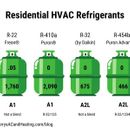Serviceability of Heat Pump Refrigerant System
R-22/Freon has been phased out (Jan 2020). R-410A/Puron is also on the way out, with other refrigerants coming to the market in 2023 (R-454b in Jan 2023?)
Questions:
1. If R-454b is slightly flammable, can it be used in older systems designed for the older refrigerants? (Doubtful)
2. Main question: should I delay replacing my AC (and gas furnace) with a heat pump for a couple of years so that I don’t get stuck with unserviceable refrigerant/system?
GBA Detail Library
A collection of one thousand construction details organized by climate and house part










Replies
I see no reason to believe the R22 and 410 will happen differently than the R12 did in that the supply of reclaimed and recycled product will find a price point for the market demand so the equipment will always be serviceable.
Chousing to buy the latest fad refrigerant also carries risk. If that flavor falls out of fashion for whatever reason the unit maybe more unserviceable than older but more common stuff.
I tend to think delaying equipment replacement for as long as possible is the better strategy and seems greener to me.
Walta
>"I tend to think delaying equipment replacement for as long as possible is the better strategy and seems greener to me."
It is better to not be constantly replacing stuff! It takes energy and resources to build/make ANYTHING, so you'd have to save enough with the new equipment to at least offset whatever it took to build/make the new stuff before you'd come out ahead. I think the R410a phaseout is a dumb idea for exactly that reason -- the replacement of all the legacy stuff is likely to be worse than just continuing to use R410a. The problem is people pushing things for "greeness" often focus on only one small concern, and don't consider the entire system. When you consider only one part of a complex issue, you often end up doing counterproductive things, which I think is the case here.
Another problem is that many of the newer refrigerants have been less efficient than the older ones, so you have the additional tradeoff of requiring more energy for the same cooling performance. That's not always the case, but it is an issue on ocassion. We run into that commercially with large chillers using R123. R123 is a *very* efficienty low pressure refrigerant, but it's on the phaseout schedule too. For very large facilities, R123 can provide a significant energy savings which isn't usually considered in the phaseout schedules.
Right now is something of a limbo period too, where R410a stuff is still common with new equipment, and the newer replacement(s) aren't very common yet. This means you have to be very careful if you want to avoid purchasing a unit that will use $expensive$ refrigerant in the near future.
Bill
Perhaps you can consider the next generation of heat pumps that have an A2L refrigerant system. Jon Harrod explains them in this article: Replacing HFC Refrigerants. In it he predicts: “By 2036, when R-410A production is cut by 85% from current levels, there will be a large number of 12- to 15-year-old R-410A heat pumps competing for a limited supply of refrigerant. Customers who chose A2L systems early on may be very glad they did.”
R410A will most likely be replaced by R32 since it's already dominant in the european market. R32 actually is more efficient and will be cheaper than R410A, as well as having the benefits of being an unblended composition.
However given COVID-supply chain issues and geopolitical events resulting in Europe pushing hard for more heat pumps, Americans will probably be stuck with R410A units for the next few years.